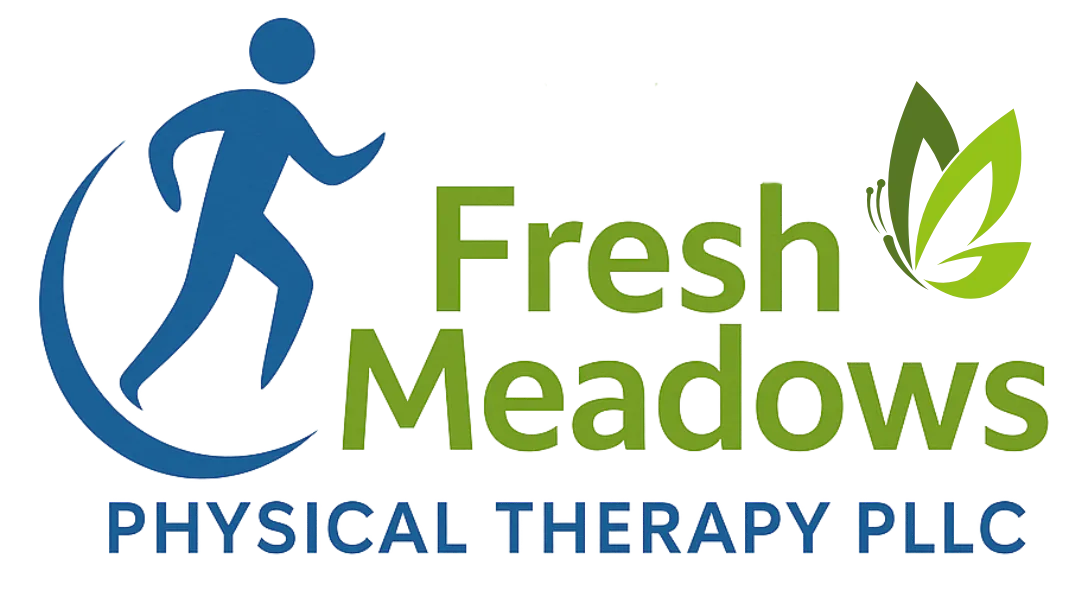Pelvic Floor Therapy in Fresh Meadows
Pelvic Floor Therapy in Fresh Meadows

At Fresh Meadows Physical Therapy, we offer specialized pelvic floor therapy led by expert therapist Jessica Bennett, focusing on women’s health.
Pelvic floor therapy is a non-invasive approach designed to address pain, weakness, or dysfunction in pelvic floor muscles, helping improve mobility and overall function.
Our treatments target tight muscles and connective tissues to alleviate discomfort and enhance bladder, bowel, and sexual function.
Patients are guided through exercises to strengthen the core and pelvic floor, as well as relaxation and posture techniques to promote healing and restore health.
Benefits of Pelvic Floor Therapy
Before choosing a rehab program, patients often assess the pros and cons of the service. Our team recognizes the advantages of pelvic floor physical therapy. We encourage you to consider this option if your symptoms become challenging to handle. Engaging in treatment with us may provide numerous benefits, including:
Reduced pain levels
Improved range of motion
Enhanced sexual function
Lower risk of chronic pain
Normalized bowel and urinary patterns
What to Anticipate During Your First Pelvic Floor Therapy Session in Fresh Meadows
Our compassionate physical therapists are here to support you through pelvic floor therapy, which aims to enhance mobility and reduce pain. During your first visit, a thorough assessment will be conducted to create a personalized treatment plan.
This assessment includes the evaluation of posture, breathing, flexibility, and mobility of your spine, hips, and abdomen. You are encouraged to bring detailed notes about your symptoms for better diagnosis.
The physical exam, potentially including an internal component, will be done carefully to ensure your comfort, allowing you to ask questions and provide feedback throughout.
Our goal is to identify and address muscle or strength-related issues to help you regain mobility and relieve pain.
You play an active role in your recovery.
You play an essential role in your recovery. Self-care strategies can help you manage pelvic floor dysfunction while improving your physical and mental health. Here are some suggestions:
Your physical therapist may recommend exercises you can perform at home, including regular Kegel exercises.
Be mindful during urination or bowel movements by avoiding pushing or straining.
Maintaining a healthy lifestyle is essential. Focus on balanced nutrition, adequate hydration, regular exercise, consistent sleep schedules, stress management, relaxation techniques, and positive thinking. Warm baths can also help relax muscles and improve blood circulation.
Certain therapeutic devices, such as electrical stimulators, biofeedback tools, dilators, or vaginal cones, may be recommended for home use.
Your physical therapist will guide you in performing self-massage techniques to aid recovery.
Pelvic floor issues can often provoke anxiety or discomfort, but seeking treatment is vital to living a happy life. Do not let stigma or shame prevent you from receiving care. We provide a safe and welcoming environment for healing and can support meaningful conversations with family or loved ones who may assist in your recovery.
Disclaimer: Our pelvic floor therapist exclusively treats women for this service.
Request An Appointment
Please fill out this form and
we will contact you about scheduling.
Privacy Policy | Terms of Service
The Significance of Pelvic Floor Therapy Designed for Women in Fresh Meadows
The pelvic floor is a group of muscles and connective tissues stretching from the pubic bone to the tailbone, providing support to the bladder, bowel, and vagina. These muscles play crucial roles in managing bladder and bowel functions, enhancing sexual function, and supporting the fetus during pregnancy while relaxing during childbirth.
Proper contraction and relaxation of the pelvic floor muscles are essential for controlling urination, bowel movements, and preventing incontinence. When these muscles contract improperly or become weakened due to childbirth, surgery, trauma, or abuse, it can lead to incontinence, constipation, pain during intercourse, or other dysfunctions.
Symptoms of Pelvic Floor Dysfunction
Pelvic floor dysfunction may cause various symptoms that can disrupt daily life. If you experience any of the following, consult a doctor:
Common Symptoms:
A frequent urge to use the bathroom or trouble starting or finishing urination.
Constipation or difficulty passing stool, with pelvic floor dysfunction tied to nearly half of chronic constipation cases.
Straining, changing positions, or using your hands to aid bowel movements.
Stool or urine leakage (incontinence).
Painful or frequent urination.
Lower back pain.
Ongoing pain in the pelvic area, genitals, or rectum, whether associated with bowel movements or not.
Related Conditions:
Pain during sexual intercourse and issues affecting reproductive health.
Stress urinary incontinence (SUI), where urine leaks during activities like sneezing, coughing, or laughing. Around 35% of women experience SUI during their lifetime.
If these symptoms occur, they could indicate pelvic floor dysfunction and should be addressed by a healthcare provider.
What Leads to Pelvic Floor Dysfunction?
Specialists suggest that pelvic floor dysfunction could result from one or more of the following conditions.
Strain during prolonged labor or vaginal childbirth
Interstitial cystitis, also known as "painful bladder syndrome"
Obesity or being overweight
Pelvic injuries from accidents or trauma
Pelvic floor surgeries
Nerve damage
Chronic coughing
Persistent constipation
Heavy weightlifting
High-impact activities like running
Overuse of pelvic muscles through frequent urination or bowel movements
Menopause and aging

At Fresh Meadows Physical Therapy, we offer specialized pelvic floor therapy led by expert therapist Jessica Bennett, focusing on women’s health.
Pelvic floor therapy is a non-invasive approach designed to address pain, weakness, or dysfunction in pelvic floor muscles, helping improve mobility and overall function.
Our treatments target tight muscles and connective tissues to alleviate discomfort and enhance bladder, bowel, and sexual function.
Patients are guided through exercises to strengthen the core and pelvic floor, as well as relaxation and posture techniques to promote healing and restore health.
Benefits of Pelvic Floor Therapy
Before choosing a rehab program, patients often assess the pros and cons of the service. Our team recognizes the advantages of pelvic floor physical therapy. We encourage you to consider this option if your symptoms become challenging to handle. Engaging in treatment with us may provide numerous benefits, including:
Reduced pain levels
Improved range of motion
Enhanced sexual function
Lower risk of chronic pain
Normalized bowel and urinary patterns
What to Anticipate During Your First Pelvic Floor Therapy Session in Fresh Meadows
Our compassionate physical therapists are here to support you through pelvic floor therapy, which aims to enhance mobility and reduce pain. During your first visit, a thorough assessment will be conducted to create a personalized treatment plan.
This assessment includes the evaluation of posture, breathing, flexibility, and mobility of your spine, hips, and abdomen. You are encouraged to bring detailed notes about your symptoms for better diagnosis.
The physical exam, potentially including an internal component, will be done carefully to ensure your comfort, allowing you to ask questions and provide feedback throughout.
Our goal is to identify and address muscle or strength-related issues to help you regain mobility and relieve pain.
The Significance of Pelvic Floor Therapy Designed for Women in Fresh Meadows
The pelvic floor is a group of muscles and connective tissues stretching from the pubic bone to the tailbone, providing support to the bladder, bowel, and vagina. These muscles play crucial roles in managing bladder and bowel functions, enhancing sexual function, and supporting the fetus during pregnancy while relaxing during childbirth.
Proper contraction and relaxation of the pelvic floor muscles are essential for controlling urination, bowel movements, and preventing incontinence. When these muscles contract improperly or become weakened due to childbirth, surgery, trauma, or abuse, it can lead to incontinence, constipation, pain during intercourse, or other dysfunctions.
Symptoms of Pelvic Floor Dysfunction
Pelvic floor dysfunction may cause various symptoms that can disrupt daily life. If you experience any of the following, consult a doctor:
Common Symptoms:
A frequent urge to use the bathroom or trouble starting or finishing urination.
Constipation or difficulty passing stool, with pelvic floor dysfunction tied to nearly half of chronic constipation cases.
Straining, changing positions, or using your hands to aid bowel movements.
Stool or urine leakage (incontinence).
Painful or frequent urination.
Lower back pain.
Ongoing pain in the pelvic area, genitals, or rectum, whether associated with bowel movements or not.
Related Conditions:
Pain during sexual intercourse and issues affecting reproductive health.
Stress urinary incontinence (SUI), where urine leaks during activities like sneezing, coughing, or laughing. Around 35% of women experience SUI during their lifetime.
If these symptoms occur, they could indicate pelvic floor dysfunction and should be addressed by a healthcare provider.
What Leads to Pelvic Floor Dysfunction?
Specialists suggest that pelvic floor dysfunction could result from one or more of the following conditions.
Strain during prolonged labor or vaginal childbirth
Interstitial cystitis, also known as "painful bladder syndrome"
Obesity or being overweight
Pelvic injuries from accidents or trauma
Pelvic floor surgeries
Nerve damage
Chronic coughing
Persistent constipation
Heavy weightlifting
High-impact activities like running
Overuse of pelvic muscles through frequent urination or bowel movements
Menopause and aging
You play an active role in your recovery
You play an essential role in your recovery. Self-care strategies can help you manage pelvic floor dysfunction while improving your physical and mental health. Here are some suggestions:
Your physical therapist may recommend exercises you can perform at home, including regular Kegel exercises.
Be mindful during urination or bowel movements by avoiding pushing or straining.
Maintaining a healthy lifestyle is essential. Focus on balanced nutrition, adequate hydration, regular exercise, consistent sleep schedules, stress management, relaxation techniques, and positive thinking. Warm baths can also help relax muscles and improve blood circulation.
Certain therapeutic devices, such as electrical stimulators, biofeedback tools, dilators, or vaginal cones, may be recommended for home use.
Your physical therapist will guide you in performing self-massage techniques to aid recovery.
Pelvic floor issues can often provoke anxiety or discomfort, but seeking treatment is vital to living a happy life. Do not let stigma or shame prevent you from receiving care. We provide a safe and welcoming environment for healing and can support meaningful conversations with family or loved ones who may assist in your recovery.
Disclaimer: Our pelvic floor therapist exclusively treats women for this service.
Request An Appointment
Please fill out this form and
we will contact you about scheduling.
Privacy Policy | Terms of Service


